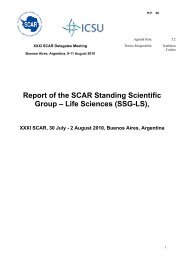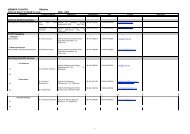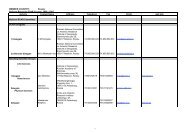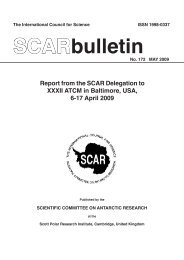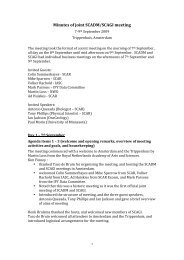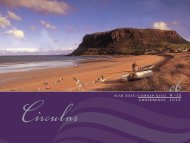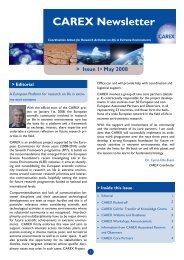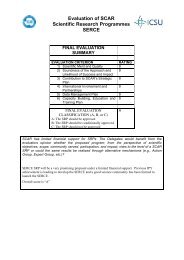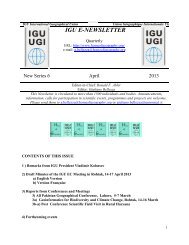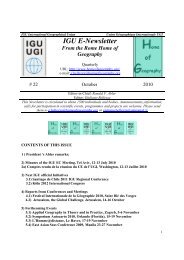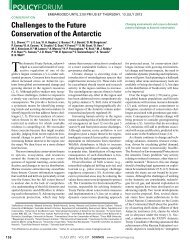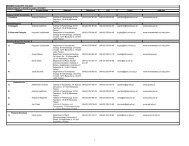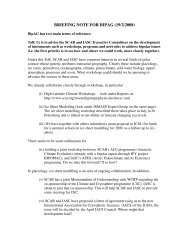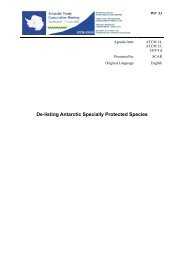SCAR Strategic Plan - Scientific Committee on Antarctic Research
SCAR Strategic Plan - Scientific Committee on Antarctic Research
SCAR Strategic Plan - Scientific Committee on Antarctic Research
You also want an ePaper? Increase the reach of your titles
YUMPU automatically turns print PDFs into web optimized ePapers that Google loves.
<str<strong>on</strong>g>SCAR</str<strong>on</strong>g> STRATEGIC PLAN 2004–2010<br />
an issue that <str<strong>on</strong>g>SCAR</str<strong>on</strong>g> will bring to the attenti<strong>on</strong> of ATCM<br />
and COMNAP.<br />
The <str<strong>on</strong>g>SCAR</str<strong>on</strong>g> President takes the primary resp<strong>on</strong>sibility<br />
<strong>on</strong> the Executive <str<strong>on</strong>g>Committee</str<strong>on</strong>g> for ATCM matters. To deal<br />
with <str<strong>on</strong>g>SCAR</str<strong>on</strong>g>ʼs interacti<strong>on</strong>s with the ATS in detail, <str<strong>on</strong>g>SCAR</str<strong>on</strong>g><br />
Delegates appoint a three-pers<strong>on</strong> committee – the <strong>Antarctic</strong><br />
Treaty System (ATS) Standing <str<strong>on</strong>g>Committee</str<strong>on</strong>g>. The Chair of<br />
this <str<strong>on</strong>g>Committee</str<strong>on</strong>g> attends the ATCM, presents <str<strong>on</strong>g>SCAR</str<strong>on</strong>g> inputs<br />
as Working or Informati<strong>on</strong> Papers, and resp<strong>on</strong>ds to requests<br />
from Parties and the CEP for scientific informati<strong>on</strong> and<br />
guidance. Papers submitted may be joint with other<br />
organisati<strong>on</strong>s such as COMNAP or the Internati<strong>on</strong>al<br />
Uni<strong>on</strong> for the C<strong>on</strong>servati<strong>on</strong> of Nature (IUCN). Papers<br />
are prepared in c<strong>on</strong>sultati<strong>on</strong> with the Standing <str<strong>on</strong>g>Scientific</str<strong>on</strong>g><br />
Groups, and circulated to the Executive <str<strong>on</strong>g>Committee</str<strong>on</strong>g><br />
before being submitted by the Secretariat. They may be<br />
based entirely <strong>on</strong> a synthesis of existing literature, or a<br />
special workshop may be called to help synthesize what<br />
is known.<br />
In the inter-sessi<strong>on</strong>al periods, the ATS <str<strong>on</strong>g>Committee</str<strong>on</strong>g><br />
m<strong>on</strong>itors the work of relevant Inter-sessi<strong>on</strong>al C<strong>on</strong>tact<br />
Groups and provides science input to their deliberati<strong>on</strong>s<br />
where appropriate. The <str<strong>on</strong>g>Committee</str<strong>on</strong>g> is funded to organise<br />
small workshop meetings if needed to progress especially<br />
difficult tasks. The Chair of the ATS <str<strong>on</strong>g>Committee</str<strong>on</strong>g> provides<br />
a report to the Executive and Delegates and briefs the<br />
SSGs <strong>on</strong> developments. It is recognised that the resources<br />
available for the provisi<strong>on</strong> of advice to the ATCM are<br />
finite and limited.<br />
As part of its proactive approach, since 2003, <str<strong>on</strong>g>SCAR</str<strong>on</strong>g><br />
has provided a plenary lecture <strong>on</strong> a relevant science topic<br />
to each ATCM as a means of informing the treaty parties<br />
about the exciting scientific topics of the day in the<br />
<strong>Antarctic</strong> c<strong>on</strong>tect. The lectures are intended to combine<br />
the interests of <str<strong>on</strong>g>SCAR</str<strong>on</strong>g> and COMNAP, to be prepared in<br />
c<strong>on</strong>sultati<strong>on</strong> with the appropriate SSGs to ensure that the<br />
positi<strong>on</strong> of the <str<strong>on</strong>g>SCAR</str<strong>on</strong>g> community is reflected, and to be<br />
placed <strong>on</strong> the <str<strong>on</strong>g>SCAR</str<strong>on</strong>g> web site. If possible <str<strong>on</strong>g>SCAR</str<strong>on</strong>g> should<br />
arrange for the <str<strong>on</strong>g>SCAR</str<strong>on</strong>g> lecture to be given annually as part<br />
of the <str<strong>on</strong>g>SCAR</str<strong>on</strong>g> presentati<strong>on</strong> to the Plenary sessi<strong>on</strong> of the<br />
ATCM.<br />
5. Data and Informati<strong>on</strong> Management<br />
The third of <str<strong>on</strong>g>SCAR</str<strong>on</strong>g>ʼs five main objectives is to<br />
facilitate free and unrestricted access to <strong>Antarctic</strong> scientific<br />
data and informati<strong>on</strong>. To meet this objective <str<strong>on</strong>g>SCAR</str<strong>on</strong>g> will<br />
take the following strategic approach:<br />
i. encourage that maximum use is made of all<br />
available data;<br />
ii. encourage the development and operati<strong>on</strong> of<br />
appropriate mechanisms to facilitate the collecti<strong>on</strong>,<br />
storage, retrieval and disseminati<strong>on</strong> of data and<br />
informati<strong>on</strong> for the comm<strong>on</strong> good; and<br />
iii. encourage the community to ensure that these<br />
mechanisms are effective.<br />
To ensure that the scientific (user) community gets<br />
what it needs in the way of data and informati<strong>on</strong> will<br />
require the development of a <str<strong>on</strong>g>SCAR</str<strong>on</strong>g> data and informati<strong>on</strong><br />
strategy, an exercise that will be undertaken jointly with<br />
COMNAP, using the <str<strong>on</strong>g>SCAR</str<strong>on</strong>g>-COMNAP Joint <str<strong>on</strong>g>Committee</str<strong>on</strong>g><br />
<strong>on</strong> <strong>Antarctic</strong> Data Management (JCADM) and the Steering<br />
<str<strong>on</strong>g>Committee</str<strong>on</strong>g> for <strong>Antarctic</strong> Data Management (STADM)<br />
and other existing structures as appropriate. Development<br />
of that strategy will have to bear in mind the following<br />
observati<strong>on</strong>s.<br />
5.1 Data And Informati<strong>on</strong> Management<br />
Meeting the increasingly complex, multidisciplinary<br />
and multinati<strong>on</strong>al challenges of todayʼs <strong>Antarctic</strong> science,<br />
especially in the global c<strong>on</strong>text, requires access to an<br />
extensive base of scientific data and informati<strong>on</strong>. With<br />
the rapidly increasing volumes of data being provided<br />
by satellite and in situ systems, <strong>on</strong>e of the most useful<br />
services <str<strong>on</strong>g>SCAR</str<strong>on</strong>g> can provide to the scientific community<br />
is a comprehensive and integrated high level data and<br />
informati<strong>on</strong> management system to facilitate high quality,<br />
interdisciplinary, pan-<strong>Antarctic</strong> science. Effective data<br />
and informati<strong>on</strong> management makes sound ec<strong>on</strong>omic<br />
sense, adding value to data that were extremely costly to<br />
collect, by making them available to the wider community<br />
for multiple investigati<strong>on</strong>s. With the advent of advanced<br />
numerical modelling of weather, climate and ice systems,<br />
and the need to predict the behaviour of those systems <strong>on</strong><br />
short time scales, it has become essential to obtain and<br />
share many kinds of data more or less in real-time from<br />
multiple sources.<br />
<str<strong>on</strong>g>SCAR</str<strong>on</strong>g> has always encouraged the free and unrestricted<br />
exchange of scientific data (at no more than the cost<br />
of supplying it), which is c<strong>on</strong>sistent with Article III-c<br />
of the Treaty, with the data policies of ICSU and of<br />
intergovernmental organisati<strong>on</strong>s like the Intergovernmental<br />
Oceanographic Commissi<strong>on</strong> (IOC) and the World<br />
Meteorological Organisati<strong>on</strong> (WMO), and indeed with<br />
the policies of many individual Treaty Parties. In these<br />
days of electr<strong>on</strong>ic storage of informati<strong>on</strong>, and electr<strong>on</strong>ic<br />
communicati<strong>on</strong>s, data need not be physically exchanged,<br />
but rather made available through provisi<strong>on</strong> of access<br />
to databases - provided that informati<strong>on</strong> is available<br />
about where the databases are and what they hold (the<br />
metadata).<br />
As <str<strong>on</strong>g>SCAR</str<strong>on</strong>g> holds no data of its own, its policy is to<br />
encourage good practice in data management, such as the<br />
use of comm<strong>on</strong> formats for data exchange and metadata,<br />
and the implementati<strong>on</strong> of open standards-based interfaces<br />
to facilitate access to databases. For example, in order to<br />
assist the promulgati<strong>on</strong> of internati<strong>on</strong>al standards <str<strong>on</strong>g>SCAR</str<strong>on</strong>g><br />
has Class ʻAʼ liais<strong>on</strong> status with the Internati<strong>on</strong>al Standards<br />
Organisati<strong>on</strong> Technical <str<strong>on</strong>g>Committee</str<strong>on</strong>g> 211 <strong>on</strong> Geographical<br />
Informati<strong>on</strong> (ISO TC211).<br />
There is no single centralised <strong>Antarctic</strong> database.<br />
Instead, <str<strong>on</strong>g>SCAR</str<strong>on</strong>g> and COMNAP members have a wide range<br />
of data and database systems, informati<strong>on</strong> about which can<br />
be obtained by any<strong>on</strong>e from a <strong>on</strong>e-stop-shop, the <strong>Antarctic</strong><br />
Master Directory (AMD), a web based metadata catalogue<br />
populated with c<strong>on</strong>tributi<strong>on</strong>s from Nati<strong>on</strong>al <strong>Antarctic</strong><br />
13



